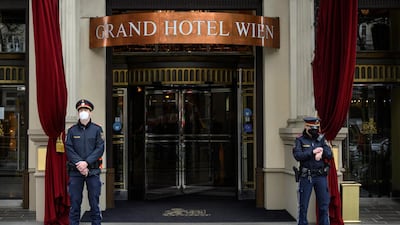Progress made at Vienna talks between world powers to salvage the 2015 nuclear deal with Iran would be threatened by any escalatory moves, European negotiators said on Wednesday.
Former US president Donald Trump walked out of the deal in 2018 but the talks in the Austrian capital, which indirectly involve the US, are seen as the best chance yet of reviving the accord.
US President Joe Biden is keen to rejoin the agreement if Tehran returns to compliance.
"We have made some progress but there is still a way to go," said a diplomat from the European group of Britain, France and Germany.
"We encourage all sides to seize the diplomatic opportunity in front of us. We condemn escalatory measures by any actor that could jeopardise progress."
A senior State Department official told reporters on Wednesday that the US and Iran are still a long way from an agreement.
But the official said that the two sides did make some headway in the drawn-out process of determining which sanctions the US will lift and the nuclear activities that Iran will have to scale back in order to return to compliance.
"The United States has a better idea of what it will need to do in order to come back into compliance with the [nuclear deal] and Iran has a better idea of what it will need to do to come back into compliance," said the senior State Department official.
"Clarification doesn't necessarily mean consensus. There's still disagreements, in some cases pretty important ones, about our respective views of what is required to return to full compliance."
The two sides have also not yet figured out the order in which the US will offer sanctions relief in return for Iran reining in its nuclear activities.
"We've not got into the discussion of sequencing," said the official. "What we can say is that a sequence where the US does everything before Iran does nothing is not an acceptable sequence.
"We've made that clear to Iran. And beyond that, we're open to different kinds of sequencing."
The talks in Vienna began at the start of the month and should resume next week after a pause for diplomats to confer with their governments.
Diplomats from Britain, China, France, Germany, Iran and Russia have been meeting in a luxury Vienna hotel, while US diplomats are taking part indirectly from another hotel near by.
The US has had no diplomatic relations with Iran since its embassy was seized by radicals after the 1979 revolution that removed the pro-West shah.
The powers last week expressed "grave concern" over Iran's move to boost uranium enrichment to 60 per cent in response to what Tehran says was an attack by Israel against the key nuclear centre of Natanz.
The step will bring Iran closer to the 90 per cent purity threshold for military use and shorten a "breakout time" to build a nuclear bomb, an ambition that Tehran denies.
Israel has neither confirmed nor denied involvement but public radio reports in the country, quoting unidentified intelligence sources, said it was a sabotage operation by Mossad.


